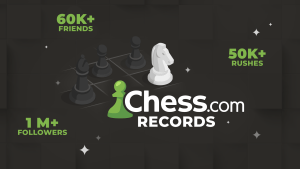
Coach Of The Month: Keti Tsatsalashvili
Chess.com's September Coach of the Month is WGM Keti Tsatsalashvili! Tsatsalashvili is no stranger to those who enjoy a good chess stream. She's not only running her own Twitch channel, but she's also a regular commentator of events such as Arena Kings, Titled Tuesday, the 2021 FIDE Online Olympiad, and more!
Many of her viewers know that Tsatsalashvili is great at explaining chess concepts to help her audience on stream. What some people don't know is that she's also a fantastic coach that will give you the extra help you need to take your game to the next level!
Readers seeking private instruction can contact Keti Tsatsalashvili via her Chess.com profile and can find other skilled coaches at Chess.com/coaches.
At what age were you introduced to chess, and who introduced you?
I started training chess with my coach at the age of eight, although I did know how pieces moved and other basic rules earlier. My grandmother introduced me to this amazing game. She used to be a great supporter of chess. Nowadays, she plays on Chess.com every day.

What is your first vivid memory from chess?
My best memory from chess is the moment when I called my father and let him know that I won the World Youth Championship. After a long silence, he told me that it was the biggest birthday gift he had ever received.
Which coaches were helpful to you in your chess career, and what was the most useful knowledge they imparted to you?
I have been training with several Georgian and foreign coaches. Three of them played a huge role in my chess career.
The first coach gave me all the basic knowledge and understanding of chess. With his help, I won my first medal at the national championship and qualified for the World Youth Championship in the Under-10 Girls category.
The second coach helped me to develop my own style. By improving my opening repertoire, I managed to win the World Youth Championship Under-16 Girls in 2007.
The cooperation with my third coach brought the most successful period of my chess career. It was a lot of hard work and emotional support. With his help I became a woman grandmaster and won five medals from the European and World Youth Championships.

Which game do you consider your "Magnus Opus?"
My favorite game is the one I played at the World Youth Championship when I was 13 years-old. I was able to find a double rook sacrifice that led to checkmate.
How would you describe your approach to chess coaching?
My chess coaching is based on the needs of each individual. All my students have their own unique characteristics. The first thing I do is to find out what the strengths of each student are so we can work to boost them—and their weaknesses so we can work on them. After that, I create an individual training plan to address those issues.
What do you consider your responsibility as a coach and which responsibilities fall on your student?
My responsibility as a coach, besides giving students proper chess knowledge, is to support them emotionally. Many players get discouraged by unlucky games. I take it as my responsibility to explain it to them, and show them they still have room for improvement and that I'll always be there to help.

What is a piece of advice that you give your students that you think more chess players could benefit from?
To work on good time management in order to avoid time trouble. There are some tricks which help to save a great amount of time on the clock.
What is your favorite teaching game that users might not have seen?
A 1991 game between GM Nigel Short and GM Jan Timman. I like it because after 30...h5, it seems like the game reached a standard position. However, Short found a brilliant plan—moving the white king from g1 to h6 to checkmate the opponent's king while the queen, both rooks, and the bishop are still on the board. Even better: Black had no way of stopping this plan.
What is the puzzle you give students that tells you the most about how they think?
I don't like using a single puzzle to determine this. During the lessons, I use Chess.com/puzzles to understand the way my students think. That method is also helpful for me to recognize their strengths and weaknesses.
Do you prefer to teach online or offline? What do you think is different about teaching online?
I prefer teaching online for multiple reasons. There are no traveling costs and you don't waste time commuting. You can also choose a coach who lives in another country, something that's impossible offline. Online coaching also gives you the opportunity to use different tools during the teaching process—for instance, by using arrows you can explain the ideas better.

What do you consider the most valuable training tool that the internet provides?
I like to use the shared analysis board, where students can see the arrows and you don't have to make the actual moves. I think this tool helps with visualization and it's an intermediate step before they start calculating everything in their own heads.
Which under-appreciated chess book should every chess player read?
I really like the book Domination in 2545 Endgame Studies by IM Genrikh Kasparian.
Prior Coaches of the Month:




